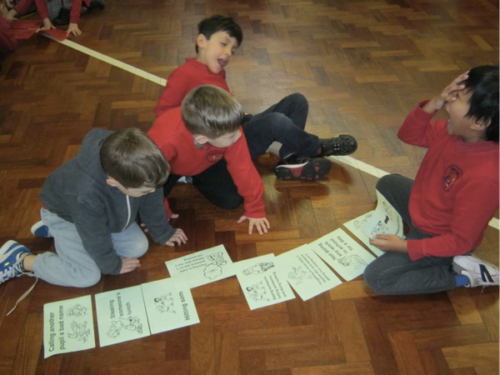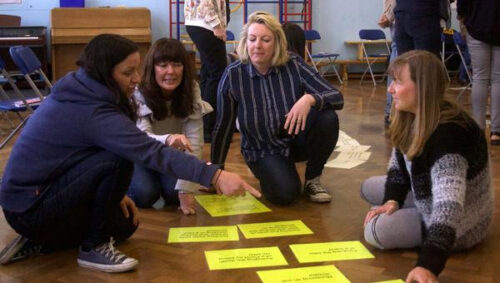Small-group discussions are vital for the development of children’s oracy: a smaller audience, lower stakes, and more opportunities to speak usually means greater confidence. Small groups also create more critical thinking – ideas and opinions are immediately put under scrutiny and subject to lively interrogation.
But letting them off the leash to work together can lead to chaotic, unordered discussions with some participating more than others. So how can we make group-work work better?
During a busy June working with over 1500 children and 200 teachers, we’ve noticed ourselves using certain tactics and activities to improve small-group discussions. Getting them to do something specific can be far more powerful than going over general expectations (which often go in one ear and out the other).

Each of the strategies below relates to our popular “Ometer” activity – a philosophical card sort – but some could equally apply to any group task where things have to be moved or placed in categories. We’ve made many such activities – here’s a throwback to some of our favourites:
Naughty-ometer– arrange these acts from most naughty to least naughty
Certainty-ometer – rank these statements from what you know certainly, to least certainly
What do you need to be happy? – sort these things into Yes and No categories
…or you might have one of your own up your sleeve. Just make sure it’s a genuinely open challenge – without a set right and wrong.
1.Model a methodical approach
If left to their own devices, children tend to take a haphazard approach and try to sort all cards at once. So model a more methodical process: take each card one at a time and work out where it sits in relation to what has already been placed.
2. Different shapes
It’s remarkable how quickly groups put cards in one long line. If they feel two or more cards are equal, they can place them alongside each other. No need to create a particular shape – this will be determined by their choices. They can also show how more x something is by how far apart they place the cards. A slight overlap means it was a tight call, or being a full length ahead is more decisive.

3. Objection!
Once a group thinks they’re finished, allow every member to state an objection to the current order. Provide some language scaffolds like: “I’d like to object to where this one has been placed”, or “Actually, thinking about it, I think this one belongs further along…”. This gives them the chance to persuade the other members of the group and decide together whether a change needs to be made.
4. Chair-people
Ask group members to take it in turns to hold up a card and ask the others “Where do we think this fits?” This encourages everyone to be involved: holding the card imbues that child with a bit of confidence, and the others are being invited for their opinions.

5. Strive for agreement
“Let’s agree to disagree” has always been a helpful phrase. But as Prof. Neil Mercer pointed out in a recent talk, this isn’t much help in the world of work. In an office environment, groups of adults generally need to agree to a course of action and stand behind it. So encourage children to find some common ground and come to a group decision they can all justify, even if they have some reservations.
Finding these emails useful?
We’ve worked with hundreds of schools through training and demonstration lessons, and we’re taking bookings for next academic year. If you’re keen to develop your pupils’ independent thinking, get in touch with us here to start a conversation.
Best wishes,
Tom and Jason
Never miss a resource! Get these P4C ideas sent straight to your inbox every week for free.